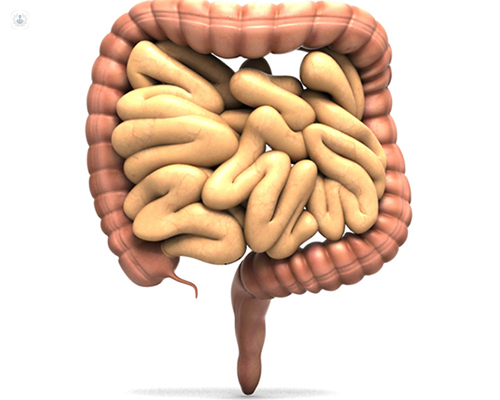Into the bowel: dealing with colorectal cancer
Autore:Colorectal, or bowel cancer is one of the most common cancers in the UK, but how much do you know about it? What causes this disease? Are tumours in the bowel always cancerous? And can bowel cancer be cured? Top colorectal surgeon Ian Jenkins provides the answers to all the questions you might have about bowel cancer:

What causes colon cancer?
Causes of colon cancer are multiple; there are several associations with the development of colon cancer. Many of these are related to lifestyle factors, such as alcohol intake, dietary factors, smoking, and the legacy that leaves upon an individual – for example, obesity is associated with the development of colorectal cancer. We’re learning that there are genetic influences associated with colorectal cancer, and in a small number of patients that is the sole reason that they develop bowel cancer.
We’re also learning that there is an interaction between the environment and the patient, and we’re understanding that the interaction with the microbiome – the bacteria that line the bowel – may have some role in the development of bowel cancer.

What are the symptoms of bowel cancer?
There are many symptoms that can be linked to bowel cancer. Common symptoms include:
- A change in bowel habit with an increased frequency of bowel movements
- A change in the consistency of the stool, in particular loose stools
- We associate bleeding with a potential for an underlying bowel cancer, and blood that is mixed with the stool is the most concerning.
There may be other constitutional bowel cancer symptoms such as weight loss and maybe abdominal pain. In certain rectal cancers, there may be pain in the pelvis or pain in the rectum but then also the sensation of incomplete emptying of the bowel.
How do you detect colon cancer?
There are various ways that colon cancer can be diagnosed and in the majority of cases, we perform a colonoscopy. There are other modalities, including CT colonography, which provides similar detail to colonoscopy, not only outlining the lining of the bowel, but also shows whether the disease may involve other organs, such as the liver or the lungs. We may also use CT scanning to assess the extent of a bowel cancer.
For rectal cancers, we use magnetic resonance imaging (MRI). We also use other forms of scanning such as PET scanning to assess the extent and disease activity and response to treatment. For certain rectal cancers, to help with assessing the extent of the disease, we also perform endorectal ultrasound. In some patients, we may even consider performing invasive assessment, such as laparoscopy.
Is a tumour in the colon always cancerous?
Growths in the bowel can be benign or malignant. When we see growths in the bowel, we mean a tumour. When a patient hears that they have a tumour, they will often associate that with being a bowel cancer or a malignancy; a malignant bowel tumour.
However, there are bowel tumours that can be benign. Often these benign tumours are polyps. Some of these polyps will eventually produce a cancer. However, many do not and can be treated at an early stage to avoid the development of a bowel cancer. There are some polyps that will never form a cancer, but their mere presence indicates that a patient is at a higher risk of developing bowel cancer and should therefore be put in a suitable surveillance program.
There are other rare benign growths in the bowel that are not polyps that do require further attention. Some of these are rare tumours, such as GI stromal tumours, carcinoid tumours or otherwise. These will require the attention of a colorectal surgeon.
Can bowel cancer be cured?
Bowel cancer is entirely curable if it is caught early. When patients experience changes in their bowel symptoms, if they undergo prompt assessment via colonoscopy or CT colonography, then we give them the best chance of picking up the disease at its earliest stage. That said, even if they present at a later stage with the disease, it does not mean that we can offer them a cure, but extent of treatment is likely to be more significant.
Surgery plays the most important role in curing patients with bowel cancer and the majority of the treatments that we offer are centered upon surgical intervention. Surgical intervention is heading more and more towards minimally invasive intervention. We perform laparoscopy on the majority of bowel cancer patients now, and there are new and novel techniques that we developed at the interface between laparoscopy and endoscopy to offer intervention with those at the earliest stages of disease. For those with more advanced disease, we know we can offer extensive treatment, including extensive surgery, which gives them the best chance of cure.

